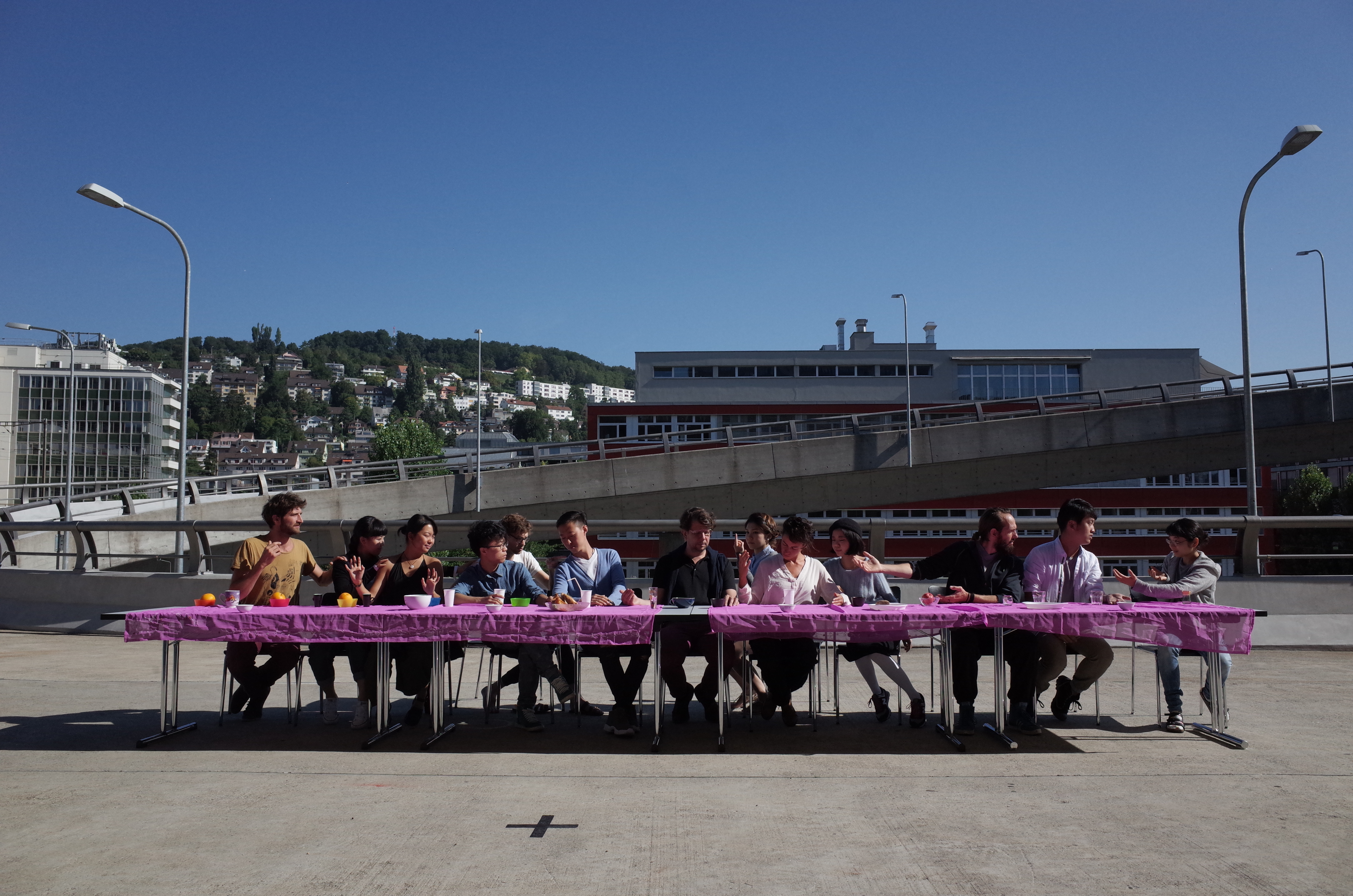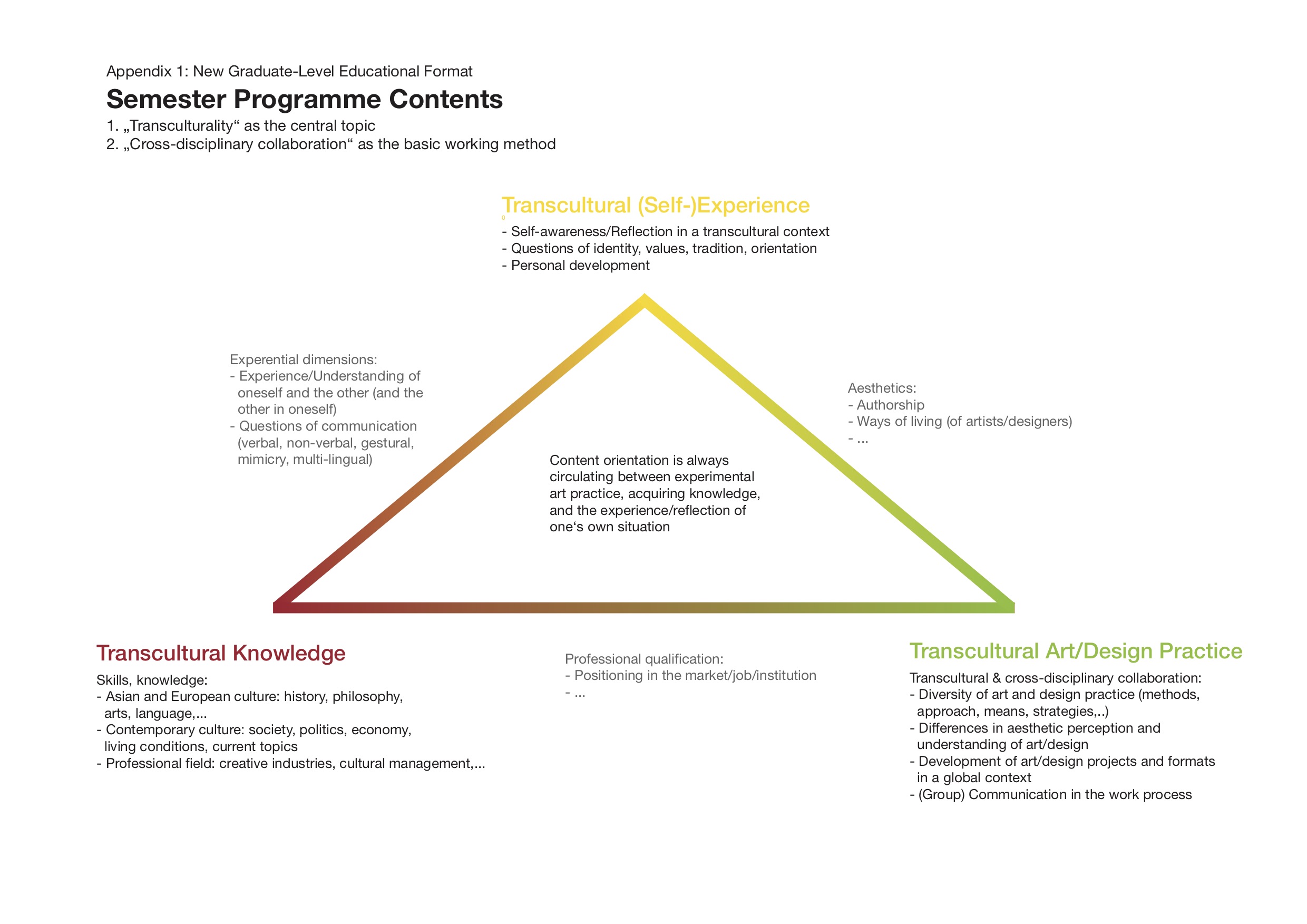International Graduate Semester Program in the Arts and Design
Transcultural Collaboration
Premise and Vision
The basis of the project is the need for a discussion and understanding of “globalization” and its emerging questions and issues. It is obvious that globalization is not only about expanding production, consumption and communication, but also implies the problems and potentials of differentiation/distinction, of provoking otherness, of different forms of cultural evolution and blending (such as creolization and syncretism), or of influencing power structures. As art institutions we need to specifically explore perspectives for how a 21st-century arts university might advance in a globalized world.
We are convinced that encountering and debating transcultural issues is essential for young contemporary art and design practitioners to be optimally prepared for their future (professional) life. Today’s world requires artists and designers to critically reflect on manifold issues and questions within a global framework. Graduates must also build the knowledge and skills needed to produce and present their work in a dynamic transnational environment. Thus, they are challenged to position and distinguish themselves within different political, social, economic, and cultural contexts.
Under these global conditions, the arts and design require not only professional expertise, but the ability to negotiate the diversity of global cultures and societies. The graduate semester program develops precisely this transcultural sensitivity. Firmly committed to excellence, it allows distinguished students to gain advanced skills and a certificate in this field. The program also enables participants to establish and to extend their international network within a vibrant metropolitan environment.
Content and Structure
The program has two central characteristics that can be experienced and explored only in this unique setting. Its general focus are transcultural topics, such as traditions, identity, genealogy of the present, values, ethics, different forms of life, globalization processes in general and between Europe and East Asia in particular. Their social and cultural sensitivity makes art and design practices ideally suited to contributing to transcultural discourse and to expressing a variety of topics through aesthetic means. Hong Kong is predestined as an exemplary location within this thematic context.
The program’s second important focus is practical collaboration between different cultures and forms of art and design. This principal working method promotes intense exchange about and first-hand experience of transcultural issues. It also helps participants to further differentiate and extend their own discipline. Students receive close supervision and expert support from selected faculty from all partner institutions and from independent artists and experts from various art and design disciplines.
The core program is dedicated to practice-based collaboration and teamwork on self-defined topics. Theoretical inputs will enable participants to critically reflect on the main topic — transculturality — and thereby to gain further insights into this pressing issue. An annually changing topic for a specific lecture series on transculturality will focus debate and provide a framework for practical experimentation. The program will be complemented with additional inputs, excursions, and workshops on subjects like cross-disciplinary collaboration, current local/global issues, and contemporary art and design in East Asia and Europe.
Exchange of Faculty and Faculty Development
The transcultural and cross-disciplinary context also puts the lecturers in the position of “learners” in this programme. Like the participating students, lecturers will also be required to expose themselves to transcultural issues, to engage in critical self-reflection, and to work in cross-cultural and cross-disciplinary teams. In association with the students, lecturers will be largely responsible for developing the concrete contents, methods, and attitudes of the individual semester. In this manner, they will gain first-hand experience and knowledge of transcultural and cross-disciplinary learning environments that they can apply and implement at their home institutions afterwards. The lecturers have a substantial interest in transcultural questions and issues and cover various fields of art and design disciplines. While the programme is guided and organised by a small permanent team, a certain percentage of lecturers will fluctuate from one semester to the other, with their time and involvement varying subject to interests and requirements.
Partners
Zurich University of the Arts (ZHdK)
Hong Kong Baptist University, Academy of Visual Arts (HKBU/AVA)
China Academy of Art/School of Intermedia Art, Hangzhou (CAA/SIMA)
Collaborators
City University of Hong Kong/School of Creative Media (CityU/SCM)
Taipei National University of the Arts, Taiwan (TNUA)
Hong Kong Academy for Performing Arts (HKAPA)
LASALLE College of the Arts, Singapore
Project Coordinators/Leading Team
Daniel Späti, Designer/Curator, Head of Transcultural Collaboration, ZHdK
Nuria Krämer, Assistant Professor, Head of Connecting Space Hong Kong
Leung Chi Wo, Artist/Head of MFA, School of Creative Media, City University of Hong Kong
Kingsley Ng, Artist, Head of MA Craft & Design, Academy of Visual Arts, HK Baptist Universiy
Shi Ke, Associate Professor, School of Intermedia Art, China Academy of Art, Hangzhou
Hongjohn Lin, Chairperson Fine Arts Department, Taipei National University of the Arts
Stephen Cheung, Head of Graduate Education Centre, HK Academy for Performing Arts
Elizabeth de Roza, Lecturer (Acting), School of Dance and Theatre, LASALLE College of the Arts Singapore
Contact
Daniel Späti
Head of Transcultural Collaboration
daniel.spaeti@zhdk.ch
CH: +41 79 432 81 03
HK: +852 6239 3079


